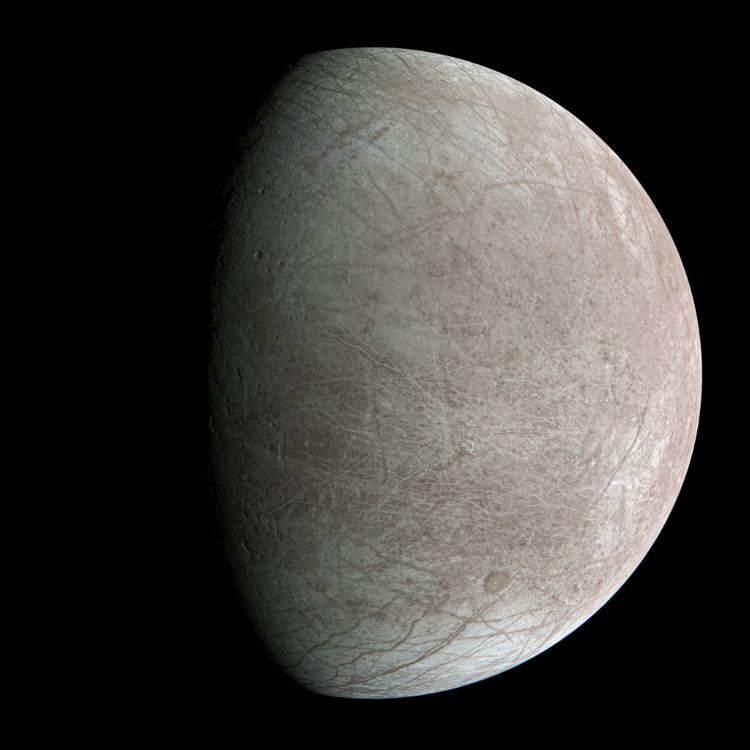Universe Today recently examined the potential for sending humans to the planet Venus despite its extremely harsh surface conditions. But while a human mission to the clouds of Venus could be feasible given the environmental conditions are much more Earth-like, a human mission to the second planet from the Sun could be (at minimum) decades away. With NASA sending humans back to the Moon in the next few years, and hopefully to Mars, what if we could send humans to another planetary body worth exploring, though it could have its own harsh environmental conditions, as well? What about Jupiter’s icy moon, Europa? It has a massive interior liquid ocean that could harbor life, and NASA is currently scheduled to launch its Europa Clipper spacecraft to this small moon in October 2024, arriving at Jupiter in April 2030. Therefore, given the exploration potential, should we send humans to Europa?
“Honestly, while I find Europa fascinating, sending humans there is a terrible idea,” Dr. Alyssa Rhoden, who is a Principal Scientist at the Southwest Research Institute in Boulder, Colorado, tells Universe Today. “The radiation environment can kill off a robotic lander in a few hours to days – with shielding! – so anything… fleshy… is going to have a very rough time.”
As previously discussed, Venus has searing surface temperatures and crushing pressures, making a human surface mission next to impossible. However, you can escape this harsh environment by traveling a few tens of kilometers higher. In contrast, Europa’s surface is constantly bombarded with intense radiation from Jupiter’s massive magnetic field, but you can’t escape it by slightly increasing your altitude. This is why every spacecraft that has explored Jupiter and its large moons, including NASA’s upcoming Europa Clipper spacecraft, has required intense shielding to prevent the electronics from burning up.
Dr. Francis Nimmo, who is a Professor in the Earth & Planetary Sciences Department at UC Santa Cruz, echoes Dr. Rhoden’s sentiments, telling Universe Today, “The biggest problem with sending humans to Europa is the radiation environment – it is extremely hostile. Even radiation-hardened spacecraft electronics have to be shielded inside a thick metal box in order to survive the Europa environment, so humans would be very unlikely to survive there for long enough to do anything useful.”
While NASA’s Europa Clipper mission will be exploring Europa, its orbital flight plan calls for the spacecraft to orbit Jupiter and not Europa to protect the spacecraft’s hardware and electronics from Jupiter’s intense radiation belts. Through this, Europa Clipper is slated to perform 50 flybys of Europa, coming as close as 25 kilometers (16 miles) of the icy moon’s surface. But, like Venus, could human exploration be conducted in orbit around Europa, despite the harsh radiation?
“An orbital colony would fare better, if it could be positioned to avoid too much radiation, but it would still be a major logistical challenge,” Dr. Rhoden tells Universe Today. “An orbiting colony of astronauts could provide (limited) ground support for ice shelling drilling projects and other short-term research excursions. And at least water retrieval would be easier! Overall, sending humans to Europa sounds exciting, but we have a long way to go before it’s feasible and likely to provide more benefit than orbiting spacecraft, landers/rovers, or autonomous drills.”
But even if an orbiting colony could work, what about resupplies for food and water (if the latter can’t be excavated from Europa)? With present propulsion technology, it takes spacecraft years to reach Jupiter from Earth while requiring multiple gravity assists just to slingshot their way to the outer Solar System. In contrast, future astronauts on the Moon would only have to wait a few days for a resupply mission. For Mars, astronauts might only have to wait six months if the positions of Earth and Mars were just right. All things considered, if a colony on Europa runs out of supplies, they might be doomed.
“Obviously, a colony on Europa would require just as much external support for food and breathable air as other targets like the Moon or Mars,” Dr. Rhoden tells Universe Today. “But on Europa, those externally supplied resources would be a decade away, and the external environment would be savagely attacking anything you put on the surface.”
Will we ever send humans to Europa? Will it be a surface or orbital mission, and what can we learn from doing it? Only time will tell, and this is why we science!
As always, keep doing science & keep looking up!

